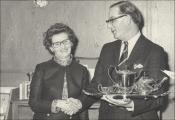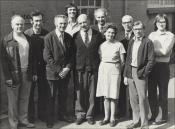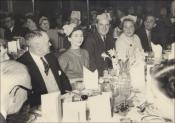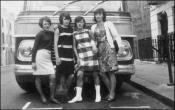Browse the interviews
Sorted by interview reference
VN015 Pegi Lloyd Williams, Metcalfes, Blaenau Ffestiniog
Pegi was in the 'navvy' during the war and afterwards she returned to Blaenau to work for David Tudor in Trawsfynydd, where she worked for ten years as a secretary, which was an honour she said. She was there for ten years until she married and her husband wasn't happy that she was out working long hours and then coming home and keeping house. She was offered a job as secretary to Mr Metcalfe in a factory making small machinery, built by the council to provide work for local boys. She had developed a interest in machinery work by doing a 'buyer's course. The factory made machines to cut chips and cut meat and mix food. She started there in 1955 and remained as secretary to Mr. Metcalf until her retirement at age 69.VSE015 Luana Dee, Sobells, Aberdare;TBS South Wales Ltd, Merthyr;NATO clothing factory, Rhymney;Guest Keen and Nettlefold (GKN), Merthyr;Thorns, Merthyr;Berlei Bras, Dowlais;Lines (Triang), Merthyr
Luana talks about her colourful family background and returning from abroad to MT. She left school at 15 (1967) and shortly afterwards began working in Berlei Bras as a machinist (2 years). Mixture of shy and assertive girls there. Brilliant German Pfaff machines. Fashion parades with employees modelling – lingerie. Piecework – paid per bra. Seconds thrown in bins and had to repair – not earning then. Eyesight good and she was fast so put on black bras. More difficult and so loosing money. But she was moved to stop her making trouble. Threatened because she stirred things up. Had to ask to go to toilet and supervisor knocking door. Watching them all the time. Sacked – quality of work? Or too forthright? Straight into another job. In BB’s - fashion parade on factory floor itself - Miss Berlei Bra competition? Describes factory. Sexual innuendo common. Xmas dance and trips. Next – Triang Toys sewing heavy duty upholstery (stayed 1 year). Some toy-making. Having fun with the factory boys in Cyfarthfa Park on Fridays afternoons. Some men brought in pornographic photographs – eye opener. Went to Thorn’s making filaments for light bulbs. Describes process. Japanese took over, it became stressful so she stayed less than a year. Moved to make industrial clothing for NATO – heavy duty sewing, more humanity here. In the TSB they made filing cabinets and she connected with the other workers. She was in the office now. In Sobell’s for a few weeks only - very large, industrial and alienating.Part of this interview is available as an audio file
VSW015 Meriel Leyden, Anglo-Celtic Watch Co. (inc. Smith's Industries and Ingersoll aka 'Tick Tock'), Ystradgynlais
Meriel left school at fifteen. She worked in a shop before going to work in the Tick Tock factory from 1955 until 1980, when the factory closed. She had to pass an eye-test to get the job, because making the watches was such intricate work. The factory was homely because they spoke Welsh. They weren’t allowed to speak when at work, but they did sing. She mentions the union and striking because of the heat and long hours. She describes teasing the men at Christmas, and the new apprentices; the Miss Tick Tock competition and the social life.



VN016 Susie Jones, Cookes Explosives, Penrhyndeudraeth
Susie began at Cookes Explosives in 1933 at age 14. The factory was in two parts then, Mining Safety Explosives and Cookes. The youngest workers were in the detonator department, not handling the dets but preparing something for them, and this work wasn't dangerous. The girls moved up according to their ages and Susie moved afterwards to the wiring and then the sheathing departments. When the war came she filled hand grenades, working three shifts, and making lots of friends. After the war, she stayed at Cookes, firstly in packing and finishing in the lab, where they tested the powder and where she was the only girl. This was in the 60s and 70s. Susie worked at Cookes for 46 years, minus two days. If she'd stayed the extra two she would have got her full pension but when she went to ask, they refused. She retired in 1979.



VSE016 Phyllis Powell, Sobells, Aberdare
Phyllis left school at 16 (1942) and started in Sobell’s 1944 – mother unhappy because reputation of factory girls. She was put on the line – putting grommets into holes. Made inspector. Union helped them get an ability award on top of wages. Coil workers on the line. Describes processes. Asked to help make special top secret coils (microchips) for head office in Slough. Quite a few Polish workers there. She loved working there – great conditions, music playing and singing. Girls from Glyn Neath playing about in toilets. Gangs of workers. Dancing in local halls. Xmas parties – man chasing! Sobell’s closed and redundancies c. 1956, but then re-opened. If injured considered to be their own fault. Left when pregnant in 1956. Later she worked as a carer.VSW016 Catherine Evans, Anglo-Celtic Watch Co. (inc. Smith's Industries and Ingersoll aka 'Tick Tock'), Ystradgynlais
Catherine left the grammar school at 16 and after working in a shop, she, like everyone else in the area, went to work in the Tick Tock factory from c.1958 until she had her first child in 1967. She describes learning the craft of getting women’s watches to ‘breathe’ and teasing new girls. She recalls Christmas parties there when she was a child and buying watches cheaply. She talks about the role of the foreman – always a male. It was a clean and happy factory with lots of singing. She remembers both Welsh and English being spoken there and the family atmosphere.VN017 Elfyn Jones, Dolgarrog Aluminium, Dolgarrog
Elfyn started work at Dolgarrog at 26. He had an uncle there who helped him get the job. His first job was lifting the aluminium sheets onto the rolls. He lived in Penmachno and drove to work. He began in 1967 and had about a week of training, the work was heavy but not bad, he said, but he didn't like doing shifts. So when a job came up as an inspector, he went for it and got it. There wasn't much in the way of health and safety rules there in the early days but they came in as time went on. There had been a swimming pool and tennis courts there for the workers but these had closed by the time he started there. The company had also built houses for the workers but he never moved to live in Dolgarrog, even though he worked there for 36 years. He worked as an inspector until his retirement in 2003.VSE017 Jim Davies, Weston's Biscuits, Pontypool;Pilkington Glass Factory, Pontypool;HG Stones, Pontypool
Jim talks of family background and Welsh language. He went to Cambridge to read medicine. In the holidays he worked at HG Stone toy factory (1956). About 8 women to every man. Female designer. He worked in patent room – describes process of making patent of teddy bear’s limbs etc. Then to stampers, cutters, stitchers on assembly, stuffers, then to inspection. Girls nice and decent. Yet some teasing. In Weston Biscuits (later Burton's Biscuits) – tannoy music playing Housewife’s Choice. Government Sponsored scheme for disabled workers in HG Stone – ‘green card’ men. Class differences in the factory and in school. Jim also worked in the biscuit factory ‘6 million eaten everyday!’ as a yard boy- empty tins flattened for scrap metal. Remembers all the women singing; class divide between office and floor. He also worked at Pilkington’s glassworks one holiday – yard boy; hard and monotonous work. Lot of cutting of glass – dangerous work. Through factory work he appreciated ‘what it was like to be at the bottom of the pile.’ They were direct, fresh and frank people. The experience stood him in good stead in his life.VSW017 Nan Morse, Deva Dogware, Gwynfe;Alan Paine, Ammanford
Nan left school at 15 (1965) and started in Deva Dogware that summer. She cut the chains, welded etc, to make leads for dogs and dogs for the blind. It was a small factory and the owner was one of them. There was quite a bit of noise and singing there. She wore old clothes and goggles. They raced to make 50 chains. There weren’t many work opportunities in the countryside. Some workers went up to Crufts. They also made belts for themselves and gaffs for catching salmon. The building was primitive. She learned skills such as using a hammer and saw. She went on trips to Blackpool and London, where she bought white boots. She was in a Welsh pop group with other workers. She left c.1968. She moved to work in Alan Paine's but she didn’t like the factory atmosphere there, where they made jumpers. She left when she became pregnant.
